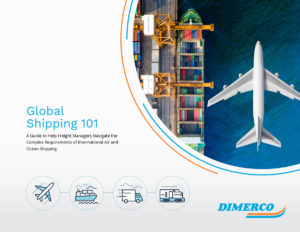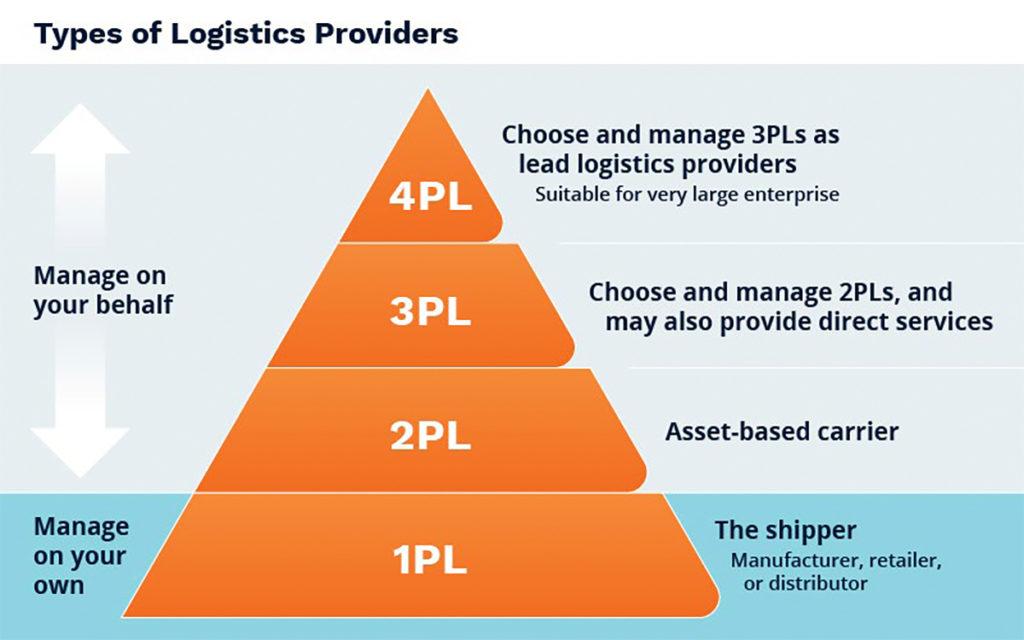Global shipping is complex—especially if you’re new to it. Between the acronyms, documentation, and dozens of service providers involved, it’s easy to feel overwhelmed. This post breaks down the key players you’ll encounter in international freight, what they do, and how they fit into your global supply chain. Whether you’re just starting out or training up your team, this is a great place to begin.
Download Guide

Looking for a complete resource on global shipping?
Download Dimerco’s Global Shipping Guide— your go-to reference for navigating transportation modes, Incoterms, trade compliance, customs clearance, and more.
Get the Guide and ship smarter across borders.
International Freight: The Players
As a global freight manager, you’ll be interacting with a variety of logistics providers. Here’s a quick review of who they are and what they do.
Consignee
That’s a fancy term for the recipient of the cargo being shipped. They are the ultimate owner of the product.
Carrier
The actual company operating the ship or plane or truck moving your stuff.
Freight Forwarder
Freight forwarders get your freight from one location to another. They arrange transit, organize your shipping documents, and send them to the right people. Your freight forwarder can often be your customs broker, but fewer customs brokers actually book space with air or ocean carriers.
Freight Broker
They are like freight forwarders in that they are intermediaries between you and carriers. But a freight broker is typically associated with domestic transportation, whereas freight forwarders focus on international transport.
Customs Broker
Customs Brokers process the necessary import or export paperwork and submit the documents directly to Customs. There is a customs broker in both the exporting and importing countries. You need to work with a broker that is knowledgeable about local customs regulations and practices.
NVOCC
Your freight forwarder can be an NVOCC, or “Non-Vessel Operating Common Carrier.” NVOCC’s manage ocean shipments under their own house bills, but they don’t typically move freight on their own vessels. Freight forwarders who are licensed NVOCCs can issue their own bills of lading – legal documents issued by a carrier to a shipper detailing the type, quantity, and destination of the goods being carried.
3PL
A 3PL (Third Party Logistics provider) is an outside company (not the shipper or receiver of the goods) that moves or stores freight between the origin and destination. For example, the trucking company that does the final delivery from the port to the destination is a 3PL.
4PL
These are managed transportation companies that manage 3PLs and serve as the “orchestrator” of a shipping process and the single point of contact for the shipper. This simple diagram might help explain the different types of providers.

Role of the Freight Forwarder
Of the key players just reviewed, you will have the most to do with a freight forwarder. These international shipping experts help you participate in international trade without having to master all the complexities involved – like negotiating and booking freight capacity, reviewing all required import/export documentation, assisting with duty payments, clearing customs, arranging insurance, and tracking and tracing shipments.
What a freight forwarder doesn’t do is physically transport your freight. That work is done by ocean carriers, airlines, railway operators, and trucking companies. The freight forwarder simply works out the most efficient method of shipping to meet your delivery requirements, then orchestrates the efforts of multiple providers to ensure cargo arrives on time, at the right place, for the right cost. Here are a few other questions to help you and your staff better understand the role of freight forwarders in the supply chain.
Can’t I just go directly to the carrier?
For air freight , you don’t contract with airlines, you will need to use a cargo agent. With ocean shipping, steamship lines won’t contract with you directly unless you are moving large volumes of cargo. If you do contract directly with an ocean freight carrier, it will limit your options. Just like a business traveler wants to evaluate multiple options before choosing the most convenient flight, cargo shippers want that same flexibility. If you go direct, you’ll be limited to the schedules and prices of only the carriers you have under contract, whereas a forwarder will look across all their carrier contracts to best match your requirement.
What about freight marketplaces? Are they an alternative to using freight forwarders?
Freight marketplaces are the cargo equivalent of Expedia and Priceline. But international forwarding is much more complex than travel agency services. If you book a personal trip from New York to London, the only supplier involved is the airline. With cargo shipments, you need a trucker to pick up the load, a carrier to ship it, a broker to clear customs, a transload site to deconsolidate, and a trucker at the destination to do the final delivery. Plus, every country’s rules and regulations are different. A simple booking software can’t solve the complexity of the global shipping process.
Another potential downside: What if something goes wrong during transit and intervention is required? Software can’t automatically reroute a shipment or troubleshoot a delay at customs. For these situations, you want to be able to reach out directly to an expert who understands and can fix the problem.
To be clear, marketplaces for global freight don’t replace forwarders, who still do the work behind the scenes. The software is meant to make the booking process faster and easier by looking at quotes from multiple forwarders. But, in doing so, it can undermine the advantage of having a close working relationship with your freight forwarder.
What should I look for when choosing a freight forwarder?
Here are a few of the most important criteria.
- Capacity in your high-volume lanes. That means they will likely have strong relationships with carriers that service that lane, giving you access to capacity with good negotiated rates that other forwarders may not have.
- Global network of owned offices. Many forwarders are smaller, independent companies that manage global projects through a network of other independent agents. This can work, but freight forwarders that rely on overseas agent partners won’t deliver the same level of service consistency as an owned office model, where each office works on a common system and follows customerspecific SOPs.
- Strong IT integration capabilities. You must be able to easily share data with your forwarder. But integrating systems can be a nightmare with the wrong partner. Many forwarders simply don’t have the resources to help, and they certainly won’t customize integrations to suit your exact needs. Look for a forwarder with its own IT resources that can complete system integrations quickly without the time (and sometimes extra cost) of going through 3rd party solutions.
- Multiple service offerings. This saves you the time and effort of arranging services that go beyond goods transport, like customs brokerage, insurance, and even warehousing services at the destination site.
Ultimately, freight forwarders make your life easier and allow your company to trade easily with overseas customers and suppliers.
What are the benefits of freight forwarding services?
- Save money. You benefit from the good rates forwarders can negotiate with carriers based on large freight volumes in a lane. Also, forwarders can consolidate your cargo with freight from other customers for a far lower consolidated rate.
- Access freight capacity. Because of the volume of freight they manage, larger forwarders have the purchasing muscle to secure the space you need.
- Gain flexibility. Forwarders examine a wide range of shipping modes and carriers to find the one that works best for your cost and service requirements.
- Access expertise. When importing or exporting products, it’s critical to have the most up-to-date information regarding customs regulations, duties and taxes. Without a reliable freight forwarding partner, you would have to develop that knowledge internally – and that comes with a cost.
- Focus on your core business. Every international shipment comes with a long list of document requirements and coordination points. Managing this complexity can easily deflect attention away from your business.
Choosing the Right Partner to Navigate Global Freight
Understanding the roles of different logistics providers is a crucial first step toward managing international freight effectively. While there’s no shortage of options, working with the right freight forwarder—one who combines capacity, service, and flexibility—can simplify everything. If you’re looking for a partner to help navigate the complexity and keep your supply lines flowing, Dimerco is here to help